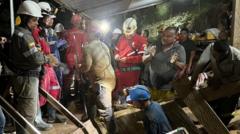Lovell's impact on NASA and mankind's quest for the stars will be remembered for generations.
Jim Lovell, Icon of Space Exploration, Passes Away at 97

Jim Lovell, Icon of Space Exploration, Passes Away at 97
The legendary Apollo 13 commander and space pioneer dies, leaving behind a legacy of hope and resilience.
Jim Lovell, the iconic astronaut who famously commanded the Apollo 13 mission and safely navigated its troubled return to Earth, has passed away at the age of 97. NASA announced his death, praising him for transforming a near-tragedy into a remarkable triumph after an explosion in the spacecraft forced the crew to abort their lunar landing. Millions across the globe watched as Lovell and his team returned home, an event etched in the annals of space exploration.
Born on March 25, 1928, Lovell was propelled towards a life in aviation after the death of his father, prompting him to join the US Navy where he trained as a fighter pilot. Yet his dreams of rocketry steered him to NASA, where he became one of the “New Nine” astronauts selected to fulfill President John F. Kennedy’s pledge to land a man on the Moon.
Lovell’s career began with milestones like his missions on Gemini 7 and 12, leading to the historic Apollo 8 voyage, where he and his crew became the first humans to orbit the Moon, capturing the world’s imagination during the “Earthrise” moment.
His legacy, however, rests most profoundly in the Apollo 13 mission. On April 11, 1970, an oxygen tank explosion jeopardized the mission and the crew's return. Lovell's calm demeanor and leadership shone as he guided the team through the crisis, ultimately leading to a triumphant splashdown in the Pacific.
Survived by his family, Lovell’s influence reached far beyond his achievements as an astronaut. As they mourn his loss, they remember him for his unwavering optimism and passion for inspiring others. Lovell retired from NASA in 1973, later penning a book that inspired the film “Apollo 13,” where he made a memorable cameo, embodying the steadfast spirit that defined his life and career.
Born on March 25, 1928, Lovell was propelled towards a life in aviation after the death of his father, prompting him to join the US Navy where he trained as a fighter pilot. Yet his dreams of rocketry steered him to NASA, where he became one of the “New Nine” astronauts selected to fulfill President John F. Kennedy’s pledge to land a man on the Moon.
Lovell’s career began with milestones like his missions on Gemini 7 and 12, leading to the historic Apollo 8 voyage, where he and his crew became the first humans to orbit the Moon, capturing the world’s imagination during the “Earthrise” moment.
His legacy, however, rests most profoundly in the Apollo 13 mission. On April 11, 1970, an oxygen tank explosion jeopardized the mission and the crew's return. Lovell's calm demeanor and leadership shone as he guided the team through the crisis, ultimately leading to a triumphant splashdown in the Pacific.
Survived by his family, Lovell’s influence reached far beyond his achievements as an astronaut. As they mourn his loss, they remember him for his unwavering optimism and passion for inspiring others. Lovell retired from NASA in 1973, later penning a book that inspired the film “Apollo 13,” where he made a memorable cameo, embodying the steadfast spirit that defined his life and career.

















